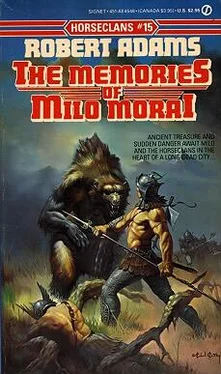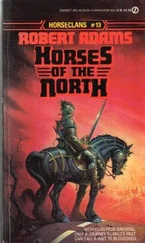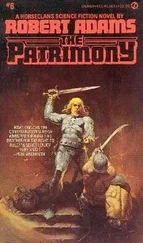After he had completely scouted out the “encamp-ment” he realized why he had seen no fires, smelled no smoke. Exhaustion, rather than caution, ruled among the emaciated, ill-armed men in their filthy, stained, tattered remnants of uniforms. Many of the sleepers were wearing dirty, blood-splotched bandages, all were many days unshaven and more than a few of the weapons he took from proximity to their sometime bearers were empty of even a single round of ammunition.
When all of the strangers’ weapons were safely hid-den, Milo went back to his own campsite at the trot and returned laden with all his effects. He had always had a weakness for stray dogs and abandoned cats. Seated, with his back against the thick hole of an ancient tree, he awaited the dawn, his rifle on his lap.
The first man to wake up wore the dark stripes of a master sergeant on the frayed sleeves of his camo battledress. He yawned prodigiously, stretched stiffly, took out a pair of glasses and meticulously polished them before putting them on . . . then he spotted Milo. With a strangled yelp, he reached for a rifle that was no longer where he had put it, then slapped hand to a pistol holster that proved empty. Staring at Milo, who had not raised his rifle or, indeed, moved at all, the noncom reached out and shook the shoulder of the man nearest to him, a man whose single remaining shoulder loop bore the muted embroidery of a lieutenant colonel’s silver oak leaf.
“Colonel, colonel!” he whispered, imperatively.
“Colonel Crippen, sir, we got comp’ny come to call.”
Milo willingly shared out all of his supplies of canned and freeze-dried foodstuffs, found a tiny, icy-cold spring and personally refilled the baker’s dozen of sound canteens left among the eighteen enlisted men and five officers, all that now remained of an under-strength battalion of California State Military Reserves.
Colonel Crippen was a bit under average height, but chunky, solid and powerful-looking;Milo guessed the officer’s age to be somewhere between fifty and sixty. Considering the circumstances, the quality of his onetime command and the impossible-to-effect orders with which he and his had been sent off, what had happened to him could have easily been predicted, but it still saddened Milo to hear it recounted.
By orders of the state adjutant general—who should have known better, thought Milo—Crippen and his battalion (four hundred and twelve enlisted men, three warrants and twenty-three commissioned officers, equipped with some bare score of Korean War-vintage two-and-a-half-ton trucks, a dozen three-quarter-ton trucks and about that many jeeps that were all about as venerable, a couple of old, boxy field ambulances, and a handful of much newer civilian vehicles pressed into service in the emergency conditions) were sent from the environs of Sacramento via Route 99 toward Bakersfieid, where they were supposed to join with a scratch force of National Guards-men, United States Reservists and a leavening of Regular Air Force from Edwards Air Force Base to try to restore, some semblance of order to the areas abutting Los Angeles and San Diego, both of which localities had taken one or more nuclear missile strikes.
The battalion had made it down to Bakersfieid in good order, having had only five trucks break down so thoroughly that they had had to be abandoned, stripped and left behind. With a convoy of armed men at his command and a pocketful of state-backed chits countersigned by the governor, Colonel Crippen had experienced scant difficulty in feeding his men or fueling and/or getting emergency repairs on the transport vehicles.
But at Bakersfield, there were no National Guards-men, not one Reservist and only a few Air Force men, which last group waited in Bakersfield for a couple of days, then headed back to Edwards AFB. The telephones were not working and neither, he discovered, was the radio Colonel Crippenhad been issued, nor had anyone bothered to give him spare parts for the thing. When he finally tracked down a civilian repair shop that would even look at the antique marvel, the owner laughed and remarked that he had not seen its like since his days in Vietnam, but he did allow Crippen the use of his own shortwave equipment . . . with the sole proviso that one of the colonel’s men would use the bicycle generator to recharge the storage batteries after each use.
At length, Crippen got Sacramento on the radio and finally dropped enough important names to persuade the communications-type to fetch to his set one of the adjutant general’s aides, who proved to be no help at all.
“Everyone out there seems to have trouble of one kind or another, Colonel Crippen. I have no idea where the other two units that were supposed to meet you are, but you have received your orders. Just see to it that they are carried out. I suggest, if you need resupply of vehicles and radio equipment, that you route your convoy out to the air base and see if they won’t help.”
But they would not allow Crippen or any one of his men any closer than a strongpoint hastily erected around the main gate. A hard-eyed captain sounded honestly sorry.
“Colonel, if it was up to me, I’d let you all in, but it’s not. When we first spotted you-all, I rung up my superior and he rung up his and so on and the answer came back, loud and clear; Nobody except Regular Air Force personnel and dependents goes any farther than you are now, on account of it’s some real bad diseases killing off the civilians all around here right and left, and the general, he don’t want none of whatever it is spreading to this command. Some nervous nellies are already saying that it could be some kind of bacterial warfare stuff.
“Was I you, I’d take my column back north. It don’t seem to be as bad, from what we’ve picked up on the radios, up north as it is here and points south and west of here. We can give you-all water and gas and a couple of days’ worth of field rations, but that’s all. You-all try to come through onto Edwards anyway, and . ..“ He waved a hand at the bristling fortifications behind him. “I’ll just have to follow my own orders and do my level best to kill ever mother’s son of you. Please don’t make me have to do that, colonel.”
Major Muldoon, Crippen’s executive officer, suggested attacking, forcing their way onto the military reservation, but the colonel would not even consider such a piece of stupidity, saying, “Pat, I think you’ve got shit for brains. Look, take a good hard look at what those flyboys have got there—heavy machine guns, rockets and God alone knows what else that we can’t see, probably, mortars and artillery and a whole hell of a lot more men. And what have we got to throw against them? Rifles, a few automatics and six medium machine guns, not even a single grenade, hand or rifle. There’s no earthly way we could sneak up on them, either; they’ve burned off all of the brush and bulldozed down everything that might give an attacker cover or concealment within rifle range.
“No, we’re going to accept what little they’re willing to give us, say ‘thank you, sir’ nicely and then go our way and do what we can for as long as we can with what we have to do it with. Our only other option is to disobey orders and run back to Sacramento with our tails between our legs, and I, for one, have never been good at running away from a fight.”
“Well, you’re making us run away from this one, David,” grumbled Muldoon sourly.
“This would be no fight here, this would be quick, bloody suicide, and if you can’t see that plain fact, Pat, maybe I need a clearer-headed exec. Our orders are to help the civil authorities in keeping order; they say not one damned thing about taking on the U.S. Air Force, for whatever reason,” snapped Crippen, rapidly losing patience. And when Muldoon opened his mouth to speak again, the colonel cut him off brusquely, saying, “End of discussion, Major Muldoon. I think those trucks up the road, on the base, there, are probably the gas and water and rations the captain mentioned. Captain Peele’s the S-4—have him handle the off-loading and reloading. I’m going back up there and see if I can con some ammo and grenades out of that flyboy. We may very well need them . . . soon.”
Читать дальше












